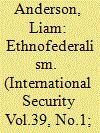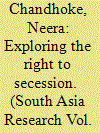| Srl | Item |
| 1 |
ID:
134091


|
|
|
|
|
| Publication |
2014.
|
| Summary/Abstract |
Scholars are divided on the merits of ethnofederalism as an institutional approach to the management of ethnically divided societies. For some, ethnofederalism is a potentially workable compromise between the demands for independence of territorially concentrated ethnic groups and the desire of a common state to preserve its territorial integrity; for critics, it is a short-cut to secession and ultimate state collapse. The argument of critics is theoretically plausible, but an examination of the universe of post-1945 states with ethnofederal arrangements, both failures and successes, shows that ethnofederalism has succeeded more often than it has failed. Within this universe of cases, moreover, ethnofederalism has demonstrably outperformed institutional alternatives, and where ethnofederal systems have failed, they have failed where no institutional alternatives could plausibly have succeeded. The increasing enthusiasm among policymakers and practitioners for prescribing federal solutions to ethnic problems is both understandable and defensible in light of these findings.
|
|
|
|
|
|
|
|
|
|
|
|
|
|
|
|
| 2 |
ID:
080816


|
|
|
|
|
| Publication |
2008.
|
| Summary/Abstract |
One of the most intractable problems confronting South Asian states and societies has been the presence of secessionist movements and insistent demands for a state of one's own. Though societies and states tend to react violently when faced with such demands, many serious issues are embedded in secessionist demands, as well as in the responses to these demands, above all issues of justice and injustice. The present article seeks to trace out the key issues involved in demands for secession, exploring reasons for why and when such demands arise in the first place. Examined within the wider context of international law, specific scenarios in South Asia are considered to propel a debate about whether secession can be argued to be a right, and in what circumstances. It is proposed that the concept of secession has, in effect, to be extricated from narrow agendas of national security, war against terror, and military strategy, and placed within the wider domain of normative political theory, which can indeed find justifications for demanding secession.
|
|
|
|
|
|
|
|
|
|
|
|
|
|
|
|